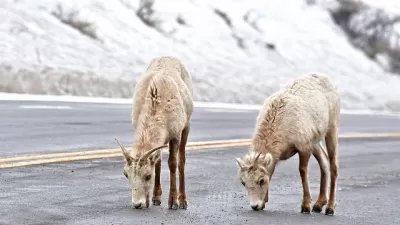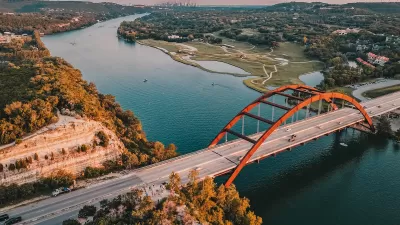Winter brings snowy conditions to roads in many cities, and many react with snow-melting salt solutions. But the physical and environmental damage of salt is leading some to look for other means of fighting the freeze.
From soil erosion to car corrosion to drinking water pollution, salting roads has a variety of unintended consequences. Those negatives are leading some cities to look for newer (though often more expensive) solutions.
"Growing awareness of the many hazards that come with road salt has some municipalities making tough decisions. Salt is an affordable and highly effective method to prevent traffic accidents and keep the local economy from coming to a grinding halt in the event of a snowstorm. But its costs also include wildlife loss, soil erosion, road damage and contaminated freshwater supplies. Sand may seem a reasonable alternative to salt, but many communities have stopped using it because it clogs sewers, muddies waterways and is costly to clean up. There are safer, albeit pricier, alternatives that communities are trying out. On certain roads and bridges in West Virginia, calcium magnesium acetate (CMA) is used instead of salt because it is noncorrosive to metals and nondestructive to concrete and other highway materials. Another salt alternative is potassium acetate (KA), which is gentler on the environment and on road and highway materials."
FULL STORY: Salty Cities: Why Communities Are Trying New Ways to Clear Snowy Roads

Alabama: Trump Terminates Settlements for Black Communities Harmed By Raw Sewage
Trump deemed the landmark civil rights agreement “illegal DEI and environmental justice policy.”

Planetizen Federal Action Tracker
A weekly monitor of how Trump’s orders and actions are impacting planners and planning in America.

The 120 Year Old Tiny Home Villages That Sheltered San Francisco’s Earthquake Refugees
More than a century ago, San Francisco mobilized to house thousands of residents displaced by the 1906 earthquake. Could their strategy offer a model for the present?

In Both Crashes and Crime, Public Transportation is Far Safer than Driving
Contrary to popular assumptions, public transportation has far lower crash and crime rates than automobile travel. For safer communities, improve and encourage transit travel.

Report: Zoning Reforms Should Complement Nashville’s Ambitious Transit Plan
Without reform, restrictive zoning codes will limit the impact of the city’s planned transit expansion and could exclude some of the residents who depend on transit the most.

Judge Orders Release of Frozen IRA, IIJA Funding
The decision is a victory for environmental groups who charged that freezing funds for critical infrastructure and disaster response programs caused “real and irreparable harm” to communities.
Urban Design for Planners 1: Software Tools
This six-course series explores essential urban design concepts using open source software and equips planners with the tools they need to participate fully in the urban design process.
Planning for Universal Design
Learn the tools for implementing Universal Design in planning regulations.
Clanton & Associates, Inc.
Jessamine County Fiscal Court
Institute for Housing and Urban Development Studies (IHS)
City of Grandview
Harvard GSD Executive Education
Toledo-Lucas County Plan Commissions
Salt Lake City
NYU Wagner Graduate School of Public Service





























